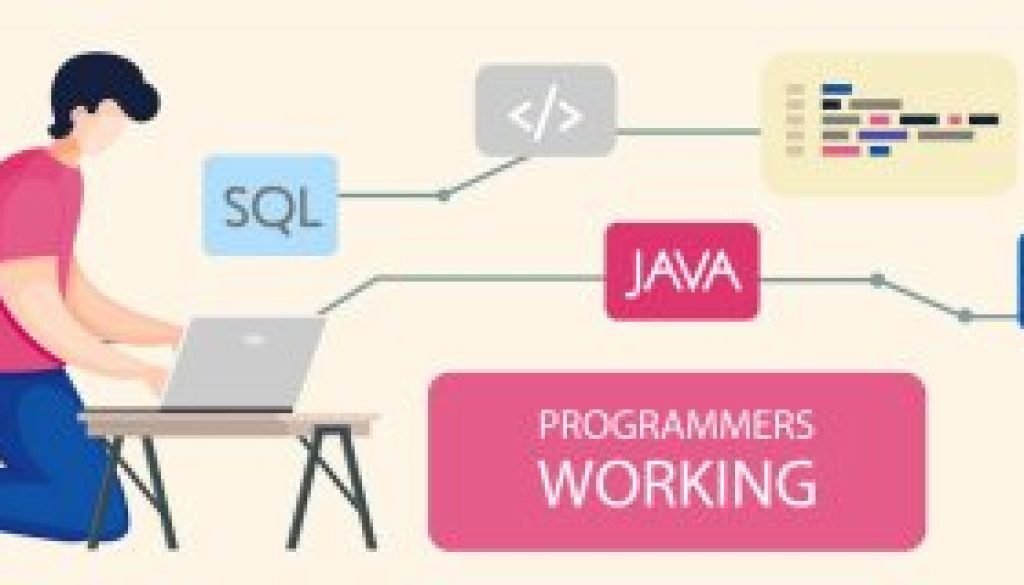Software Engineer vs. Programmer – Exploring the Key Distinctions
Lets uncover Software engineer vs. programmer!!!
Understanding the Roles
Software Engineer
Within the realm of technology and software development, the differentiation between a software engineer and a programmer frequently engenders bewilderment. Both roles wield substantial influence in the process of software development, yet they encompass distinctive skill sets, responsibilities, and career trajectories. In this all-encompassing compendium, we shall embark on an in-depth exploration of the disparities, correspondences, and idiosyncrasies inherent in the roles of software engineers and programmers. Upon perusing this exposition, you will attain a lucid comprehension of the two vocations, their pertinence within the industry, and the proficiencies requisite for excellence in each domain.

Recognize the Roles Software Engineer
A software engineer assumes the role of a professional tasked with the conception, creation, and perpetual maintenance of intricate software systems. They act as the architects of software endeavors, adopting a holistic approach to the resolution of challenges. Software engineers are schooled in the craft of crafting scalable, streamlined, and dependable software solutions. Their endeavors typically encompass:
- Collaborating with cross-functional teams
- Ensuring software security and stability
- Conducting system and performance testing
- Implementing best coding practices
Programmer
In contrast, programmers concentrate their efforts on the composition of code to implement the designs and functionalities embedded within the software. They epitomize the “hands-on” code smiths who breathe life into the visions conceived by software engineers. Key duties of programmers encompass:
- Translating software requirements into code
- Debugging and troubleshooting code
- Developing specific software components
- Collaborating closely with software engineers
Educational Background

Software Engineer
Typically, software engineers bear the fruits of formal education, having acquired degrees in computer science, software engineering, or allied fields. They often hold bachelor’s or master’s credentials, endowing them with profound insights into algorithms, data structures, and software architectural constructs.
Programmer
Programmers may traverse a similar educational route, but they also possess the capacity to distinguish themselves through self-directed study and practical acumen. While a formal education can furnish advantages, many proficient programmers have honed their aptitudes via coding boot camps, online courses, and real-world projects.
Read about C++ Language: Mastering the C++ Programming Language: A Comprehensive Guide
Skill Sets
Software Engineer
- Proficient in software design patterns
- Strong problem-solving skills
- In-depth knowledge of algorithms and data structures
- Expertise in system architecture
- Excellent communication and teamwork abilities
Programmer
- Proficiency in multiple programming languages
- Debugging and troubleshooting expertise
- Strong coding skills
- Adaptability to various coding challenges
- Collaboration and teamwork skills
Career Paths
Software Engineer

Software engineers routinely witness broader horizons in terms of their career progression. They have the latitude to metamorphose into an array of roles, including but not confined to:
- Software Architect
- DevOps Engineer
- Technical Lead
- Product Manager
Programmer
Programmers can opt for specialization in particular programming languages or technologies and may embrace roles such as:
- Backend Developer
- Frontend Developer
- Mobile App Developer
- Game Developer
Salary Expectations
Software Engineer
In virtue of their extensive repertoire of competencies and the multifariousness of their obligations, software engineers tend to be the recipients of more munificent remuneration. The precise figures may fluctuate contingent on geographic location and accumulated experience; however, they frequently luxuriate in remuneration packages that are the epitome of competitiveness.
Programmer
Conversely, programmers, while indispensable, may encounter a somewhat more restrained spectrum in terms of earning potential compared to their software engineer counterparts. Nevertheless, their salaries have the capacity to burgeon, particularly as they accrue experiential wisdom and expertise.
Additional Information
- Software Engineer Vs. Programmer: What’s the Difference?
- Software Engineer vs. Programmer: What’s the Difference?
- Software Engineer vs Programmer: What’s the Difference?
The Impact of Software Engineers
Software engineers wield a momentous influence in shaping the technological terrain. Their obligations transcend the parameters of individual projects, and as a consequence, they exude a broader impact. Here are pivotal facets of their influence:
Innovation and Product Development
Software engineers inhabit the vanguard of innovation. They conceive, conceive, and bring to fruition the software underpinning contemporary technology. Whether it encompasses a revolutionary mobile application, a sophisticated electronic commerce platform, or a labyrinthine database system, software engineers are the lodestars propelling product gestation, thereby facilitating commercial entities in offering avant-garde solutions to their clienteles.
Cybersecurity
Protocols In the wake of the escalating reliance on digital conduits, cybersecurity has assumed the mantle of a paramount concern for individuals, enterprises, and governmental entities. Software engineers play an instrumental role in the formulation of impregnable software systems. They institute robust security fortifications, encryption modalities, and data safeguarding techniques in order to shield vulnerable information.

Automation
Automation is orchestrating a transformation in a plethora of sectors. Software engineers undertake the task of contriving and fabricating mechanized solutions that streamline processes, diminish human fallibility, and augment efficiency. Ranging from autonomous vehicles to smart domiciliary appliances, automation is catalyzing a revolution in the realms of both work and daily living.
Career Growth
The trajectory of software engineering is fraught with auspicious prospects and opportunities for career advancement. Veterans in this discipline frequently transition into roles of leadership, where they provide guidance and mentorship to budding developers. Moreover, they contribute to the delineation of the strategic direction of their organizations, thereby influencing product roadmaps and decisions concerning technological architectures.
The Vital Role of Programmers
While programmers may not always occupy the spotlight, their contributions are pivotal in the context of software development. They are the codification warriors who endow substance to conceptual constructs. The following expounds upon the imperative nature of their vocation:
Turning Concepts into Reality
Software engineers are responsible for conceiving software systems, yet it is the programmers who bestow the breath of life upon these concepts, rendering them into functional applications. They are the wordsmiths who write the code that is the lifeblood of software functionality. Absent the expertise of skilled programmers, innovative concepts would languish in the realm of theoretical abstraction.
Continuous Improvement
Programmers shoulder the responsibility of preserving and enhancing software. They are the custodians who identify aberrations, performance bottlenecks, and areas primed for amelioration. This continuous process is essential to ensuring that the software remains functional and abreast of the demands of the contemporary epoch.
The Backbone of the Tech Ecosystem
Programmers contribute to an extensive array of industries, spanning from finance and healthcare to entertainment and education. Their labor forms the bedrock upon which the software systems that animate modern life rest. They engender the means by which enterprises can engage with their clienteles, researchers can scrutinize data, and enthusiasts can relish immersive experiences.
Varied Specializations
Programmers have the liberty to opt for specializations across a profusion of domains, enabling them to align with their proclivities and predilections. Some may fixate on web development, designing user-friendly websites and web applications, while others may immerse themselves in game development, crafting interactive and captivating gaming experiences.
Career Growth Opportunities

Software Engineer
Within the tech industry, software engineers are bestowed with a profusion of prospects for career progression. Let us delve into some of the advanced roles and specializations that lie within their purview:
- Machine Learning Engineer Machine learning engineers are dedicated to the development of algorithms and models that empower machines to learn and render decisions predicated upon data. They occupy the forefront of artificial intelligence and labor on projects encompassing natural language processing, computer vision, and recommendation systems.
- Data Scientist Data scientists undertake the analysis of extensive datasets, extracting valuable insights therefrom. They harness statistical methodologies, machine learning techniques, and tools for data visualization to unravel intricate conundrums and buttress decision-making grounded in data.
- Cloud Architect Cloud architects are tasked with the design and stewardship of cloud-based infrastructure and amenities. Given the escalating reliance on cloud computing, this role is in great demand. They interface with cloud platforms such as AWS, Azure, and Google Cloud.
- Full-Stack Developer Full-stack developers possess expertise spanning both frontend and backend development. They possess the faculty to craft comprehensive web applications, from the aesthetics of user interfaces to the management of databases and server infrastructures.
Programmer
Programmers are afforded the liberty to specialize in a multitude of domains, each affording distinctive vistas for career progression:
- Game Developer Game developers are the masterminds behind interactive video games for a myriad of platforms. Their purview encompasses game design, graphic artistry, audio engineering, and the mechanics of gameplay. This vocation marries creativity with technical acumen.
- Mobile App Developer Mobile app developers undertake the design and construction of applications tailored to smartphones and tablets. They toil across platforms such as iOS and Android, creating user-friendly and responsive applications.
- Web Developer Web developers are dedicated to the conception of websites and web applications. They harness technologies including HTML, CSS, JavaScript, and an array of web frameworks to breathe life into web-based projects.
- Embedded Systems Programmer Specialists in embedded systems programming dedicate themselves to the creation of software designed for embedded systems that find application in devices such as IoT apparatuses, vehicular systems, and medical equipment.
In Conclusion
In summation, the roles of software engineers and programmers are both integral to the software development domain, despite the marked disparities in skill sets and obligations. Whether one aspires to embark on a journey as a software engineer or a programmer, a comprehensive understanding of the intricacies of each vocation is indispensable for fostering a successful career trajectory.
As the landscape of the technology industry undergoes perpetual metamorphosis, software engineers and programmers collectively hold pivotal roles in the genesis of innovative and consequential software solutions. Whether you are drawn to the holistic approach to troubleshooting that software engineering affords, or the hands-on craft of coding that characterizes programming, the world of technology beckons with a multitude of opportunities for those animated by a fervor for software development.

By delving into the distinctions and affinities between these vocations, you are poised to chart a triumphant career path that aligns with your proficiencies and aspirations. The tech industry stands ready, offering a dynamic and ever-evolving terrain that reveres originality, innovation, and dexterity.
Endowed with the information disseminated within this extensive compendium, you are well-equipped to make judicious determinations regarding your career trajectory within the enthralling sphere of software development. Your odyssey commences here, replete with limitless possibilities.
Frequently Asked Questions (FAQs) – Software Engineer vs. Programmer
1. What is the main difference between a software engineer and a programmer?
- A software engineer is involved in the entire software development lifecycle, from design and planning to maintenance, whereas a programmer focuses primarily on writing code to implement specific functionalities.
2. Do software engineers and programmers require different skill sets?
- Yes, they do. Software engineers typically need a broader skill set that includes problem-solving, project management, and system design, while programmers often concentrate on coding and implementing specific features.
3. Is a software engineer a higher-ranking job than a programmer?
- Not necessarily. Job titles and rankings can vary depending on the company. Some programmers may have senior or specialized roles, and some software engineers may work in more junior positions. It depends on the organization and individual responsibilities.
4. What is the educational background required for a software engineer and a programmer?
- Both typically require a strong foundation in computer science and programming, often with a bachelor’s degree in a related field. However, software engineers may benefit from additional coursework in software architecture and design.
5. Are there differences in job responsibilities between software engineers and programmers?
- Yes, software engineers are often responsible for the entire software development process, including requirements analysis, system design, and testing. Programmers primarily focus on writing code according to predefined specifications.
6. Which career path offers better job prospects and earning potential, software engineering or programming?
- Job prospects and earning potential can vary based on factors such as location, industry, and individual skills. In some cases, software engineers may have more opportunities for career advancement and higher salaries due to their broader skill set.

7. Can a programmer transition into a software engineering role, and vice versa?
- Yes, it is possible to transition between the two roles. Programmers with strong problem-solving and design skills can move into software engineering, while software engineers can choose to specialize in coding and become programmers.
8. Are there any certifications or specific training programs recommended for software engineers or programmers?
- Various certifications and training programs are available for both roles, such as Certified Software Development Professional (CSDP) for software engineers and vendor-specific certifications for programmers. The choice depends on individual career goals.
9. How do the day-to-day tasks of a software engineer differ from those of a programmer?
- Software engineers often spend more time on project planning, architectural design, and collaborating with stakeholders. Programmers, on the other hand, primarily focus on coding, debugging, and implementing specific features.
10. What role is more in demand in the tech industry, software engineers or programmers? – Demand can fluctuate, but both roles are typically in demand. The specific need may depend on the company’s projects and goals. It’s essential to stay up-to-date with industry trends and job market conditions.
MCQs
1. What is the primary difference between a software engineer and a programmer?
A. Software engineers primarily focus on writing code.
B. Programmers are responsible for system design.
C. Software engineers are involved in the entire software development lifecycle.
D. Programmers work exclusively on debugging.
Answer: C. Software engineers are involved in the entire software development lifecycle.
2. Which role requires a broader skill set, including problem-solving and project management?
A. Programmer
B. Both software engineer and programmer
C. Software engineer
D. Neither
Answer: C. Software engineer
3. Is job ranking higher for a software engineer compared to a programmer?
A. Yes, always.
B. No, always.
C. It depends on the organization and individual responsibilities.
D. Job ranking is unrelated to these roles.
Answer: C. It depends on the organization and individual responsibilities.
4. What is the typical educational background required for both software engineers and programmers?
A. High school diploma
B. Bachelor’s degree in a related field
C. Master’s degree in computer science
D. PhD in programming
Answer: B. Bachelor’s degree in a related field
5. Which role is primarily responsible for writing code according to predefined specifications?
A. Both software engineer and programmer
B. Software engineer
C. Programmer
D. Neither
Answer: C. Programmer
6. Can a programmer transition into a software engineering role and vice versa?
A. No, it’s not possible.
B. Only programmers can transition to software engineering.
C. Only software engineers can transition to programming.
D. Yes, it is possible.
Answer: D. Yes, it is possible.
7. Which certification is often recommended for software engineers?
A. Certified Programming Professional (CPP)
B. Certified Software Development Professional (CSDP)
C. Certified Coding Specialist (CCS)
D. Programming Expert Certification (PEC)
Answer: B. Certified Software Development Professional (CSDP)
8. How do the day-to-day tasks of a software engineer differ from those of a programmer?
A. Software engineers primarily code, while programmers focus on project planning.
B. Software engineers focus on project planning, while programmers primarily code.
C. Their day-to-day tasks are identical.
D. Software engineers only work on system design.
Answer: B. Software engineers focus on project planning, while programmers primarily code.
9. Which role typically spends more time on debugging and implementing specific features?
A. Software engineers
B. Programmers
C. Both equally
D. Neither
Answer: B. Programmers
10. Are software engineers or programmers more in demand in the tech industry?
A. Software engineers are always in higher demand.
B. Programmers are always in higher demand.
C. It depends on the company’s projects and goals.
D. There is no demand for either role in the tech industry.
Answer: C. It depends on the company’s projects and goals.



